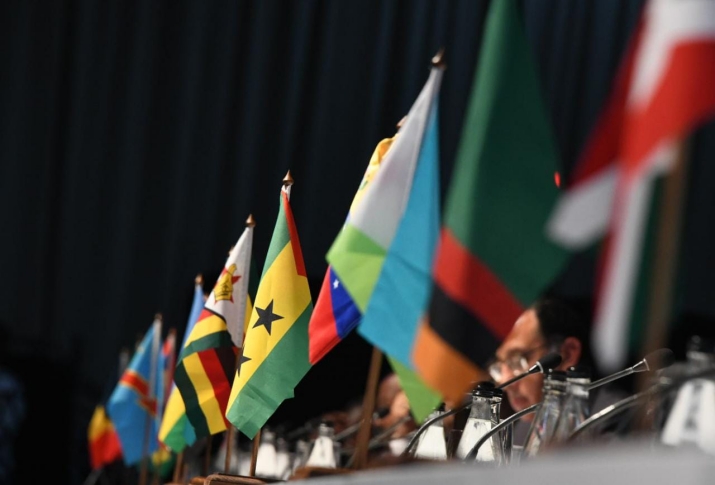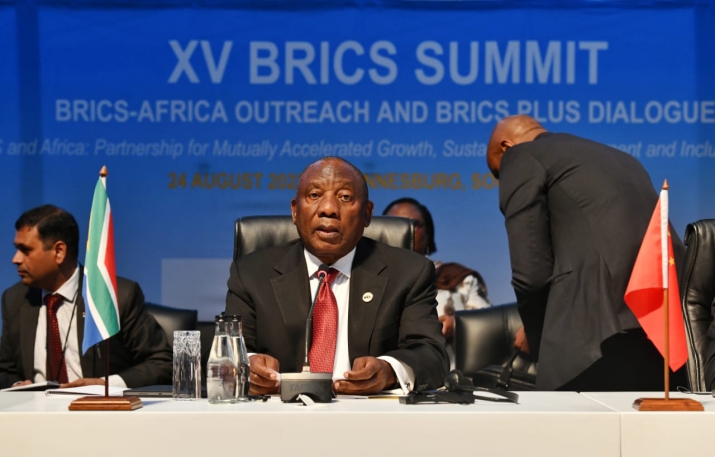|
||||||||||
| Home Nation World Business Opinion Lifestyle ChinAfrica Multimedia Columnists Documents Special Reports |
|
||||||||||
| Home Nation World Business Opinion Lifestyle ChinAfrica Multimedia Columnists Documents Special Reports |
| ChinAfrica |
| Expansion of BRICS and Beyond |
| With the addition of new members, the BRICS group is set to increase its influence at the global stage |
| By David Monyae | VOL. 15 October 2023 ·2023-09-22 |

National flags at the BRICS-Africa Outreach and BRICS Plus Dialogue in Johannesburg, South Africa, on 24 August
The splendour of the 15th BRICS Summit has come and gone. The rendezvous in the so-called “Africa’s richest square mile,” Sandton, north of Johannesburg, was quite a diplomatic spectacle which brought together 60 developing countries from across the Global South, as well as the United Nations Secretary General Antonio Guterres.
The summit was a watershed moment as it saw the expansion of the group through the admission of six new full members, namely, Argentina, Egypt, Ethiopia, Iran, Saudi Arabia, and the United Arab Emirates (UAE). This particular summit, by far the biggest and perhaps the most consequential of all summits, has divided opinion between BRICS pessimists on the one side and BRICS optimists on the other.
Critics of expansion
The pessimists are worried, admittedly rightly so, about the weak democratic and human rights credentials of some of the BRICS members, including Russia, Iran and Saudi Arabia. They argue that the inclusion of these countries points to a future global order in which human rights and democracy will be marginalised on the global agenda. Others have pointed out that the tensions among the BRICS members, namely, Egypt and Ethiopia, and Saudi Arabia and Iran, are likely to undermine the group’s effectiveness and coherence.
Critics have also stressed that the expansion of BRICS will make it difficult for the group to take decisive positions on global issues since it now has to accommodate the interests of 11 countries whose consent is required before a decision is taken.
The South African government has also come in for heavy criticism with some quipping that South Africa proved it is a cheap date over its handling of the gatherings. Others noted that the BRICS summit displayed the contradictions of South Africa’s foreign policy, pointing to the centrality of human rights and democracy in its foreign policy and its eagerness to work with countries within the BRICS group.
Growing influence
While the arguments of the BRICS pessimists are not devoid of merit, I believe, like many in the optimist camp, we should cut the BRICS and the South African government some slack. The summit marked a significant milestone for the BRICS group which has grown in leaps and bounds in the last 15 years.
After 15 years of existence, the group’s influence on the global stage is growing, not waning. This is not only demonstrated by the addition of the six new members, but also by the fact that the new members had to be picked from 23 aspiring candidates who had submitted formal applications for membership. Moreover, over 40 countries have expressed interest in joining the group.
Chinese President Xi Jinping applauded the BRICS expansion, saying it is historic. He noted that it demonstrates the commitment of BRICS countries to cooperate in unity with all developing countries. “The expansion is also a new starting point for BRICS cooperation. It will inject new vitality into the BRICS cooperation mechanism and further strengthen the forces for world peace and development,” he said. He also made the call for all to join hands together to write a new chapter of emerging markets and developing countries seeking development through solidarity and cooperation.
With the new members, the BRICS group will now account for 30 percent of the global GDP and represent 46 percent of the global population, about 54 percent of the population in the developing countries and 43 percent of all global oil production. This gives the BRICS group not only some measure of legitimacy, but also significant geostrategic and geoeconomic advantages to be able to wield real influence on global issues such as international trade, climate change, development finance and the international financial system.

South African President Cyril Ramaphosa speaks at the BRICS-Africa Outreach and BRICS Plus Dialogue in Johannesburg, South Africa, on 24 August
Focus on development
This is a group of countries whose growth and development potential have been severely constrained under the Western-dominated international system. Their principal common interest lies in the reform of the international system which refers to a cluster of global governance institutions including the International Monetary Fund, the World Bank, and the World Trade Organisation among others, which continue to reinforce Western dominance at the expense of the rest. While there may be differences in details over how to reform these institutions, the overarching goal is clear enough, that is, to foster coherence and achieve consensus among the BRICS countries.
Although the BRICS group still lacks a permanent secretariat to coordinate its activities and implement its decisions, the group is moving towards more institutionalisation as it has evolved in the last decade and a half. The system of the rotation of the BRICS chair is well defined and the duties of the chair are clearly outlined to avoid any misunderstandings. In the absence of a permanent secretariat, the group is coordinated by BRICS ambassadors or sherpas in each country.
There are new structures such as the BRICS New Development Bank headquartered in Shanghai and the BRICS Contingent Reserve Arrangement, which are responsible for issuing development loans and attending to economic crises respectively. Other structures that have emerged under the BRICS umbrella include the Business Council, the Parliamentary Forum, the Think Tanks Council, the Women’s Business Alliance, and the Academic Forum among others. Although the influence of these structures in decision-making is still minimal, their presence points to a future where BRICS will not be an exclusively government affair. As such, the group is gradually becoming more complex and sophisticated, which will help to build the capacity to implement its decisions, coordinate its activities, improve mutual understanding, and also resolve differences among the group members.
Critics have pointed out that South Africa’s moral standing is blighted by its association with countries with a questionable human rights and democracy record, implying that South Africa should only have relations with countries “perceived as democratic” and “respecting human rights.” I think this criticism is a bit unfair. South Africa does not have the gravitas to embark on a global human rights and democracy crusade.
| About Us | Contact Us | Advertise with Us | Subscribe |
| Copyright Beijing Review All rights reserved 京ICP备08005356号-5 京公网安备110102005860号 |